Ron Clay
Ron was born in Sheffield in 1942 and has been an angler for almost as long as he can remember.
In 1962 he formed the Sheffield based Northern Specimen Group as the result of fairly lengthy correspondence with Dick Walker. In 1965 this group was directly responsible for the formation of the National Association of Specimen Groups, most of the original work being done by Ron’s old friend Eric Hodson.
  Ron Clay |
Ron emigrated to South Africa in 1967 and fished extensively over much of the sub-continent. He met his angling mentor, Dick Walker, on many occasions and corresponded with him for many years.
He returned to the UK in 1994 and today loves most types of angling, especially fly fishing for trout. He has been a regular contributor, both articles and forum postings, on FishingMagic for several years. His forum postings are often controversial, ‘fishing for bites’ as he often puts it, but they’re never intentionally nasty.
Ron ‘The Hat’ Clay, a widower, having lost his beloved wife some years ago, is well read in most things, deeply conservative, and has led a full life, most of it involved with fishing.
My Story – Ron Clay, Part 1
Early Days
WHEN GRAHAM MARSDEN suggested that I write a brief autobiography for FishingMagic I told him it would be best if I didn’t mention South Africa. Graham then told me adamantly that I had better write about a few experiences I had there as that is what people will expect.
So here is my life, warts and all.
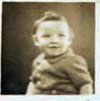  A cherubic young Ron. 1944 and aged 18 months |
I was born in Handsworth Sheffield on 22nd March 1942. My mother’s maiden name was Betty Adcock whose ancestors came from Nottinghamshire and who were mainly in service to the nobility of the Dukeries around the Clumber, Welbeck and Thoresby estates. My father, Edward Clay, was the son of a Sheffield steelworker – also Edward Clay, who achieved a high position in the rolling mills at the onetime English Steel Corporation in Tinsley. My grandfather was a true craftsman in steel, now a dying breed in this part of the world. He was also the youngest of a large Victorian family of boys, many of whom emigrated to the USA. He married Lilian Trusswell ca 1915, a local beauty, make no mistake.
My mother once told me that she had a heck of a job bringing me into the world. I weighed 10lbs 2oz at birth and the Germans were bombing nearby Darnall at the time!
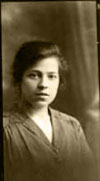  Lilian Trusswell, Ron’s gran |
First recollections
My very first recollections were of lots of men working in fields being guarded by soldiers with rifles – German POWs of course. Then there are memories of my grandfather taking me on long walks in a pushchair, through Orgreave to the village of Treeton next to the River Rother. In those days the Rother was grossly polluted, it used to change colour about four times daily. I guess that looking at the Rother lit a spark somewhere in my love for running water even though it was filthy and lifeless beyond imagination.
There was also the Orgreave Coking Plant that produced coking coal for the smelting of steel at the Rotherham and Sheffield blast furnaces. I remember the fascination of watching tons of flaming, smoking coke being pushed out of the ovens.
One of the advantages I had as a youngster was that both my grandfather and my father owned motor cars. When the war ended and petrol became available I was taken out on many trips into the surrounding countryside, together with my younger brother Tony.
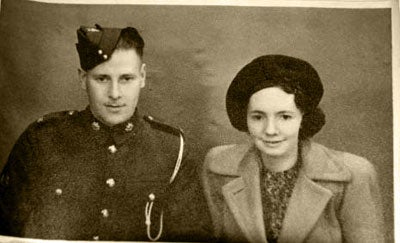  Ron’s mum and dad in 1941 |
Clumber Park was a common destination, as was the River Trent. I used to spend hours watching the anglers on the Trent, so much so that my father had a job getting me to come home.
The Move to the Countryside
In 1951, My grandfather purchased a small farm between the North Nottinghamshire villages of Letwell and Gildingwells. In fact the villages were in Yorkshire, but only just. It was a nice little bit of ground and my grandfather, helped by my dad, started rearing all sorts of animals including poultry, pigs and goats.
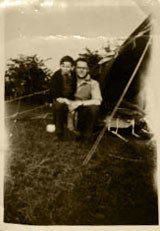  Ron, camping with his dad |
I went to the local primary school in Woodsetts. There was only one incident I really remember at this school and that was the fight I had with one of the other pupils who was becoming a bit of a bully and was starting to throw his weight about. Anyway, he picked a fight with me. What he didn’t realise at the time was that I was powerfully built, even for my age then, and far better fed. We were living off the fat of the land at that time.
Well he came into me and gave me a rather weak and watery slap. I retaliated with a tremendous punch which knocked out several of his teeth and laid him out flat on the football field.
He was out for about half an hour if I remember, and apart from the blood which spouted in gouts out of his mouth and my hand hurting like hell where I had hit him, I felt scared; scared that I might have even killed him.
All the kids, and the teacher which came out to see what had happened, screamed at me that I should never had tried to hit this little bloke and that I didn’t know my own strength!
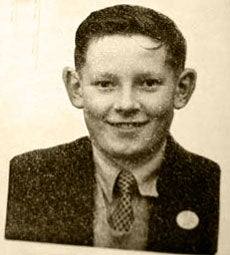  Tough guy Ron aged 10 |
But it was he that had picked the fight, not me.
Living in the English countryside was idyllic. It didn’t take me long to realise that two fields below the farm existed paradise – an old estate lake populated by tench, bream, pike, roach and very big perch.
I acquired some fishing tackle, first from my mother and then my grandfather gave me an ancient split cane cum whole cane Sheffield style rod made in the 20s. Both myself and my brother Tony regularly took ourselves off to this stretch of water – Langold Lake is its name.
Now in those days, we didn’t have much money and it cost sixpence, if I remember, to fish there. The lake was bailiffed by one of the most miserable specimens of humanity I’ve ever known in my life. And if you didn’t have sixpence, you would be kicked off. We got into the habit of hiding our tackle behind a suitable bush when he came round. When he disappeared, out would come the tackle and our fishing would recommence. We caught all sorts of species from Langold Lake, including some very nice perch and the odd pike. On one occasion I caught a nice tench which was just short of 2lbs. I still remember that capture today.
When I acquired my first bicycle I lost no time in visiting many other waters in the area. The River Ryton at Blyth where I took some very large dace was a regular venue, as was the Chesterfield Canal, the many flooded sand and gravel pits near Worksop, The River Idle at Bawtry and occasionally the River Trent.
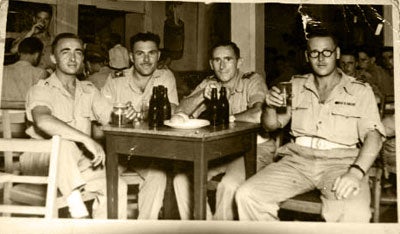  Ron’s dad – on the right, in a bar in Italy celebrating the end of the war in 1945 |
It was about this time when I discovered Angling Times and the writings of Dick Walker and Bernard Venables. The profound effect that Walker’s writings had on me, have lived with me all of my life.
Back to the City
Shortly after I started at Dinnington Technical High School we moved back to Sheffield, Woodhouse to be exact. A few years later, after finishing my GCEs, I started work as a technical apprentice at United Coke & Chemicals Co. Ltd. I spent two days a week at Rotherham College of Arts and Sciences studying for my ONC in mechanical engineering and two evenings a week doing English and maths A Levels.
During weekends fishing became a major part of my life, as did the opposite sex, but I will not talk too much about the latter other than saying that in hindsight I treated them horribly.
I acquired a small motorcycle that took me many miles fishing and I made a great deal of use of the fact that the Woodhouse station was on the line for all the stations to Boston in Lincolnshire. During the summer months I would often leave for the banks of the Witham early on the Saturday morning, spend the night there and than return on the Sunday afternoon.
Specimen Hunting
When I was 19 years of age I read an article in Angling Times that was written by one Peter Butler of the London Specimen Hunter’s Club. In the article he detailed how he, together with other members of his club, had discovered and caught the big roach of the London water supply reservoirs. The fact that it was through a team effort by all the members involved appealed to me tremendously.
At the time, a few other specimen hunter’s groups had come into being.
I investigated the matter in the North Notts/South Yorkshire area and discovered that there were no such groups. Then one day whilst I was sat in the drawing office at my firm, I wondered if I could form one myself.
I went home that evening and wrote a letter to none other than Dick Walker c/o Angling Times. In the letter I asked him how to form a specimen group and what was involved. As I, with temerity, put the letter into the postbox, thinking he won’t even write back, I forgot about it and life carried on as before.
About a week later I received a rather thick brown envelope with the Letchworth post mark. “Who on earth could this be?” I wondered.
I opened the letter and there, beautifully written on both sides of plain thin white paper in “copperplate” script were explicit instructions from the great man himself on how my specimen hunter’s club should be formed. Also in the letter were many hints and tips, especially on canal fishing for big roach and fishing the River Idle. It seemed that Dick as well as me knew all the waters in my neighbourhood!
My next job was to write to Angling Times and The Sports section of The Sheffield Telegraph – known as “The Green ‘Un” asking if there were any anglers in the Sheffield area who were interested in forming a specimen hunter’s club. A few days later the letters were published and about a week after that my Dad’s letterbox was kept very busy indeed. For about three days literally scores of letters arrived, most of them quite rude in the extreme. One of the replies consisted of a parcel full of small dark coloured bottles. In the parcel was a note consisting of bits of script cut from various newspapers stuck together which read:
“If you are looking for specimens, here are a few to be getting on with.”
To cut a long story short I was able to select about 10 good letters from the pile of dross and these names were to form the basis of what initially was called the “Northern Anglers Specimen Hunter’s Group”.
This name was changed to The “Northern Specimen Group” at a later date when Eric Hodson became group secretary.
We started meeting regularly and many of us fished together of course. Many of us caught lots of big fish, in some cases bigger than our wildest dreams.
Then I started writing in earnest. My first ever published article appeared in “The Midland Angler” in 1962. This encouraged me somewhat and when Sheffield Newspapers launched “Angling Telegraph“, I began a series entitled: “For Beginners” This led to full scale features, many of which I did with my old friend Steve Crawshaw. And I didn’t stop with the Angling Telegraph either. I had articles published by Anglers Mail, Fishing, Angling, Creel, Fishing Gazette, Angler’s World, Coarse Angler and a few others too.
As the years passed it was noticed that certain members of the NSG fished more often with certain other specific members. Not only that, a few of us were more successful than others to the extent that a couple of schisms took place based I think on petty jealousy. All this came to a head in 1966, when my own membership of the group was terminated. The reasons for this were many, and now is not the time or place to go into these issues; suffice to say that my dismissal resulted in a number of resignations and a new group came about, a group run by Tag Barnes of which I was invited to join.
On the positive side however, I made a number of lifetime friendships. Our group was also instrumental in the founding of the National Association of Specimen Groups, the organisation which became the basis of the Big Fish Movement, which still exists today.
Part 2 – South Africa, Fly Fishing and The Present Day
| My Story – FishingMagic Members |
|
We get to know each other on the forum to a great extent, and sometimes we meet at fish-ins, but how much do we really know about each other? We have members from across the world, ranging from manual workers, office workers, solicitors, policemen, writers, editors, photographers, soldiers, actors, film producers, angling guides, technicians, medical people – you name it and we’ve got ’em in our ‘family’. Yet most often we don’t really know who it is we’re debating with or having a laugh with on the forum. So now’s your chance to put that right. This is where FM members can tell the FishingMagic community all about themselves. Tell us who you are, what you do, what your fishing is all about and what it means to you, tell us what makes you tick, warts and all. Stories can be anything from 1000 to 5000 words long, preferably, but not necessarily, with a selection of pictures. Email the words and pictures to me at jeff@fishingmagic.com and I’ll do the rest. |













